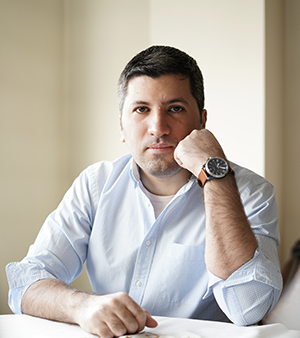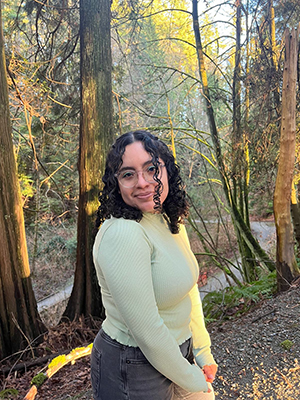Pain and Patience: Jessica Rodríguez interviews Siavash Saadlou

Volunteer Jessica Rodríguez talks with Siavash Saadlou, winner of our Constance Rooke CNF Prize with his memoir, "The Enemy" (featured in winter issue #225). They discuss writing about war, having an autobiographical memory, and why prose writers should read poetry.
Siavash Saadlou is a Pushcart Prize-nominated writer and literary translator. His short stories and essays have appeared in Southeast Review, Cagibi, and Plenitude Magazine, among other journals. His poetry has been anthologized in Essential Voices: Poetry of Iran and Its Diaspora (2021) and Odes to Our Undoing: Writers Reflecting on Crisis (2022). He is the winner of the 2023 Constance Rooke Creative Nonfiction Prize and the 55th Cole Swensen Prize for Translation.
One of the things I enjoyed about your piece is that it captures the reader’s attention throughout. What type of research went into keeping this memoir true to the setting, facts, plot, and characters?
This particular piece didn’t require heavy research to be honest. It was all based on a heart-rending incident that had happened in real life during middle school, but I tried to contextualize it and draw the reader’s attention to a much larger theme: the never-ending repercussions of war. I guess you could say that having an autobiographical memory like mine is both a blessing and a curse. On the one hand, it allows you to write about your lived experience in excruciating detail; on the other hand, it torments you all your life in unexpected and inexplicable ways. That said, I’ve also been keeping in touch with friends from my school years, so I can always seek them out to confirm or correct certain recollections if need be. In terms of capturing the reader’s attention, what I’ve learned over time is that you don’t need to use overwrought prose to make your point. There’s a story in Sarah Manguso’s genre-bending book 300 Arguments in which she talks about attending, if memory serves, a poetry reading. While there, she is seated next to a young man who has a bit of a weather-beaten face. Eventually, Manguso decides to create some small talk with the young man and asks him about what it is that has brought him to the poetry reading. The young man simply responds, “I went to war.”
“The Enemy” deals with heavy subject matter, including child abuse. How was writing those scenes out for you? Do you have a self-care plan after writing heavy/difficult pieces?
Well, I’m glad you used the term “child abuse” because that’s the nomenclature some people shy away from, thinking it’s sometimes justifiable to beat the bejesus out of young boys just because they’re naughty or lippy. The self-care part of your question reminded me of a haiku by Allen Ginsberg:
Good at the beginning…
tears roll down
my palsied right cheek.
There are times when I begin to write a new piece, and everything is going well, until I get choked up remembering the minutiae of a certain incident. Sometimes I even end up crying or sobbing. Some people mistake this kind of reaction with “weakness,” but you wouldn’t touch such thorny subjects with a ten-foot pole if you were weak, let alone try to write them out. The whole idea behind persevering with traumatic events for me is like what the American writer Eudora Welty once said about “confronting an experience and resolving it as art.” You wouldn’t believe the number of times I have reflected on this question: Why am I putting myself through hell revisiting incidents I have fought so hard to get away from just so I can tell my story? Then, I realize that while my writing derives from individual and collective suffering, I’m not merely writing about the pain—I’m trying to tame it, temper it, transcend it. Otherwise, all I’ll be doing as a writer is chronicling a reality, and that is far from interesting for my money. I think it was Whitman who once wrote in a letter, if I’m not mistaken, about how he hoped for or anticipated the day when “some wise man will start to argue that two and two are not four but five or something else.” If two and two are always four in the creative process, I think something is amiss.
As I read your piece, I found myself thinking about how important it is for everyone to read about different cultures and points of view. What led you to write about the effects of the Iran-Iraq War?
Let me get one thing out of the way first: I never ever imagined I would someday be writing a memoir. Not in English, at least. My English was decent during high school, but the bar for teaching English at schools in Iran was way too low back in the day. I actually began learning English in earnest at the age of eighteen, having muddled through high school after several supplementary exams because I hated studying. A friend of mine persuaded me to sign up for ESL (English as a Second Language) classes, and so I did. That was when I became addicted to English which, etymologically speaking, is curious because “addicted” comes from the Latin word addicere meaning “devoted.” I basically became religiously devoted to the English language.
The memoir I’m working on is called Congratulations and Condolences, alluding to the words used in the letter template sent out on behalf of the Foundation of Martyrs and Veterans Affairs to the bereaved family when someone would die as a so-called “martyr.” The memoir, as you pointed out, takes on the devastating effects of the eight-year Iran-Iraq War. After all, this protracted war claimed at least a million lives between the two nations, which is nothing to sneeze at.
One major problem following the war was that so many people in Iran never got to see or feel the full extent of the war’s devastation on families who were left to pick up the pieces on their own. Of course, the government was also quite crafty in that it successfully created a rift between those who had lost a loved one in the war and those who hadn’t; it was a classic case of driving a wedge between people and making sure their empathy or sympathy for one another would die down soon enough. Tyranny feeds off of division—then you add economic hardships to the equation, and you’ll have yourself a cauldron of repressed anger among the general public. Sadly, part of the narrative the government has sold the Iranian people is that children whose dads had died in the war were given preferential or VIP treatment at their schools because those schools were specially designed for them. My memoir might, among other things, be able to disabuse many of this very narrative and offer an unblinking portrait of what it’s like to live with the familial and social ramifications of war. I’m sorry for my awfully long answer to your question, but such is the nature of war; it reduces everything to nothing and individuals to numbers. In my writing, I’m essentially making every effort to go beyond just enumerating the dead.
Many challenges come with writing, such as thinking about how best to tell the story. How do you decide the point of view for each piece you write? Does writing poetry pose the same challenges as your creative nonfiction? Does your creative nonfiction writing, translation work, poetry, and/or fiction writing influence each other?
I obviously use the first-person POV in my memoir, but a lot of what’s included in my work has to do with what I’ve witnessed over the years. There’s a chapter, for example, about the first time I learned about the notion of “phantom limb pain” at the age of seven through my friend’s dad.
Writing poetry poses a different set of challenges for me vis-à-vis writing creative nonfiction. Poetry, as Yeats once said, is “man arguing with himself.” Therefore, the approach is different. With poetry, I get to have more leeway, so to speak, whereas with creative nonfiction, I need to reproduce an event and make sure the story is as accurate and as incisive as possible.
There’s certainly a symbiotic relationship between the various genres I write in. My deep grounding in translation, for example, enables me to have a special appreciation for verbal dexterity. My understanding of musicality in poetry sometimes informs my aesthetic choices in prose. Prose writers seem to be generally disinclined to read a great deal of poetry. That, I believe, is like denying yourself the opportunity to learn from the best. An example I often invoke is a poem from Tomas Tranströmer called “Allegro” which he wrote after the infamous stroke that left him hemiplegic in the 1990s. The poem presents music as a medium to seek solace in. One of the lines from the poem goes: The keys are ready/kind hammers fall. I think prose writers should read a great deal of poetry because probably only a poet has the creative toolkit to describe the keys of a piano as “kind hammers.”
As an emerging writer myself, fresh from university and just starting a writing career, what is your advice for success?
It would be a bit pompous of me to give advice to young writers because I myself have yet to publish my debut full-length book. So, instead, I would like to encourage young writers to read more meticulously, not just voraciously. I’ve always been an eclectic and arbitrary reader of literature. But one thing that’s always been a priority for me is the focus. I abhor the idea of reading a book that doesn’t lead to material change in my approach to and understanding of literature. Granted, there are times when “pleasurable reading” itself is the end goal, but that’s a different story.
It’s also important to be ready to suffer as a writer. When I’m teaching etymology, I always tell my students about the curious double-meaning of the Latin word sufferre from which we have “suffering” and “sufferance”—“pain” and “patience.” Robert Hass sums this up perfectly: “It’s hell writing and it's hell not writing. The only tolerable state is having just written.”

Jessica Rodríguez









